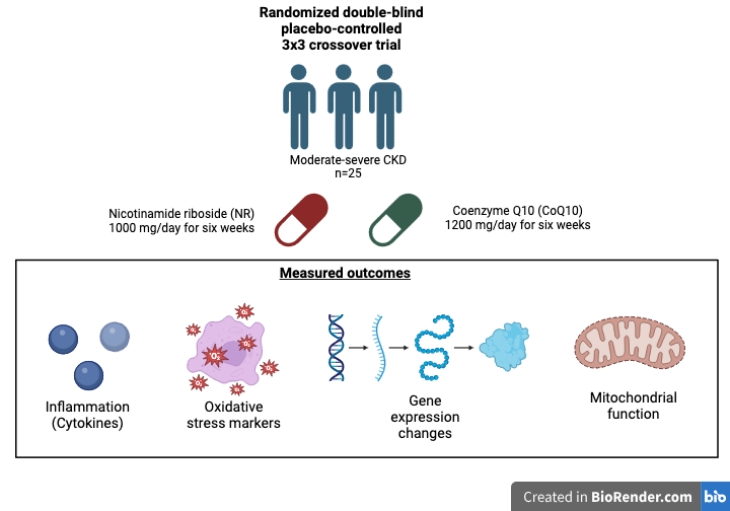Could chemical compounds improve metabolism and reduce inflammation?
Countless ads and companies promote products they claim will improve metabolic health. But do they actually work?
Possibly, according to a new study at UC Davis Health, in which researchers have identified two compounds that could potentially help.
Published in the Clinical Journal of the American Society of Nephrology, researchers analyzed the effects of the compounds nicotinamide riboside (NR) and coenzyme Q10 (CoQ10) on inflammation, oxidative stress markers, gene expression changes and mitochondrial function in chronic kidney disease (CKD) patients.
“Many rodent studies suggest the compounds NR and CoQ10 improve muscle function or increase health span aging,” said Baback Roshanravan, professor of medicine and the Paul F. Gulyassy endowed professor in nephrology. “This study is the first well-designed human trial that tests some of the potential beneficial metabolic changes in CKD patients. Patients with CKD are understudied in most trials because the kidneys are important in drug elimination and the condition may contribute to a greater potential for treatment related side effects.”
Trial design and results
The team conducted a randomized placebo-controlled trial comparing CoQ10, NR, and placebo in 25 patients. Participants received NR (1000 mg/day), CoQ10 (1200 mg/day) and placebo separately for 6-week treatment periods in a random order. Neither the participants nor the researchers knew who got the treatments and who got the placebo.
Researchers tested the impacts of CoQ10 and NR on inflammation, oxidative stress markers, gene expression changes and mitochondrial function.

Results of the study showed:
- Use of both NR and CoQ10 decreased markers of oxidation stress
- CoQ10 decreased two markers of systemic inflammation (IL-13 and CRP)
- CoQ10 also showed changes in genes related to stress and immune response and improvements in lipid metabolism
- NR improved immune cell mitochondrial function
- NR showed improvements in genes related to carbohydrate and lipid metabolism and immune function and a reduction of harmful lipids including triglycerides
“We were encouraged to see a modest effect of decreasing inflammation, some antioxidative properties and decent improvements in metabolism in a relatively short treatment period,” said Armin Ahmadi, postdoctoral scholar of nephrology at UC Davis Health and lead author of the study. “We have previously shown that both NR and CoQ10 are safe, well tolerated and exhibit no serious side effects.”
He went on to explain inflammation is a normal part of the body's response to injuries and invaders (like germs). But when it happens without an injury or invader, it can harm healthy parts of the body and cause a range of chronic diseases.
The presence of antioxidants is positive because these molecules can help the body fight off harmful free radicals, which have been linked to health conditions like diabetes and cancer, and improved metabolism helps the body burn calories more efficiently, potentially aiding in weight management and boosting energy levels.
“These results lead us to believe these compounds could be beneficial to other chronic illnesses beyond just chronic kidney patients,” Ahmadi added.
“Improving physical performance will always require more than just pharmacologic therapeutic options. However, by better understanding what is happening in the body as a result of these compounds, it could help us improve exercise tolerance and boost the effects of exercise.”—Baback Roshanravan
Next steps
Researchers now want to investigate the possible effects of combining the compounds NR or CoQ10 with an exercise regimen.
In a new trial, they will evaluate the additive effect of CoQ10 with physical performance. Their hope is it will help them better understand the interplay of the compounds and exercise to improve its efficacy.
“Improving physical performance will always require more than just pharmacologic therapeutic options,” Roshanravan said. “However, by better understanding what is happening in the body as a result of these compounds, it could help us improve exercise tolerance and boost the effects of exercise.”




